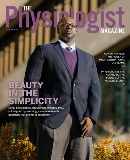Career Planning
New and updated APS tools can help you map out a satisfying career.
By Jennifer L.W. Fink

Are you doing exactly what you thought you’d be doing in your career? For many physiologists, the answer is no, as detours and seemingly small decisions—take this professor’s class over that one, connect with that person at a conference—can lead to different opportunities and career paths.
John Harrell, PhD, a research physiologist with the U.S. Air Force, initially planned a career in academia.
David Pollock, PhD, FAPS, “had no idea” what he was going to do when he started college. He discovered he liked physiology, so he attended graduate school, intending to be a teacher “in a sport coat with patches on the elbows, sitting in a coffee shop and talking to students.” Today, after stints in industry and academia, Pollack is the director of the Cardio-Renal Physiology and Medicine Section, a translational research program, at the University of Alabama-Birmingham (UAB).
Sherry Adesina, PhD, planned to work in government. After all, she’d completed an internship with the U.S. Food and Drug Administration during her last years of graduate school. But while attending an APS conference, she learned about postdoctoral opportunities in industry. Adesina is now a senior medical science liaison for Adaptive Biotechnologies, a company working in immune-driven medicine.
Career planning sounds simple, linear and straightforward, but scientists’ interests, needs and opportunities change as they progress through life. That’s why Adesina prefers the term “career outline” to “career plan.”
“I know I want to advance in my career,” she says, “but I don’t put strict guardrails on what that looks like. If an interesting or dynamic opportunity presents itself, I want to make sure that I’m agile enough to pursue it.”
That flexible mindset is key to a satisfying career and life. “Your career doesn’t have to look like anyone else’s,” Adesina says. “It shouldn’t, because it’s yours, and you get to make it whatever you want.”
Most people do best in an environment that suits their personality and preferences. Pollock worked at Harvard’s Institute for Circadian Physiology for a couple years after completing his education, and while he enjoyed the prestige of working at Harvard, on a NASA project, he found that “the culture was not a fit for a slow-talking, Midwestern country boy,” he says. So, when he was offered a position in the Drug Discovery Division of Abbott Laboratories in Chicago, he took it. He remained in that position until his boss was reassigned and the company wanted him to work in another area.
“The culture changed on me,” Pollock says, so he searched for other opportunities and returned to academia.
Pivoting when circumstances change is smart. “Life is too short to remain in a situation that is chronically stressful and unsupportive,” says Ann Schreihofer, PhD, FAPS, professor of physiology and anatomy at the University of North Texas Health Science Center. “Follow a path that you find rewarding.”
Don’t get overly attached to career labels. Instead, seek opportunities to develop. Look for places that have the tools and infrastructure to support your growth and people whose skill sets complement yours.
“My best advice is to avoid categorizing your work into a specific field or inquiry,” Schreihofer says. “Find a creative, supportive and interactive environment. Bring what you know to an environment that will embrace a fresh perspective and allow you to blossom.”
That’s what Pollock did when he accepted a position at UAB. “I wanted to go somewhere where I could translate my research,” he says. He chose UAB, even though the institution didn’t have a physiology department, because they have “a tremendous clinical research unit,” he says. He now works with colleagues across departments.
His willingness to try new things is likely one reason Pollock has had a long, varied and personally satisfying career. Adesina encourages other physiologists to explore and recognize opportunity, even in disappointment.
“Sometimes you’ll fly out to a location to meet with someone, and they’ll need to cancel,” she says. “Don’t just go home. Find out if there’s someone else you can talk to or meet with. Create opportunities for yourself. You owe it to yourself and to the career you want to have.
APS Job Board
Using the APS Job Board
www.physiology.org/jobs
When John Harrell, PhD, decided to explore career opportunities, he “hit the job boards.” That’s where he noticed the posting that changed his life: an ad for a contract research physiologist to work at Wright-Patterson Air Force Base.
Today, job seekers and employers have access to a multitude of job boards and online search engines. The enhanced and updated APS Job Board is a great starting place for those looking for jobs and those looking for help.
Relaunched in fall 2022, the APS Job Board is now interactive. You can scan the current listings, search by location or keyword, or quickly view the “newest” or “featured” offerings. Job seekers can also upload their resume and set up job alerts, which will automatically email them daily with information about suitable jobs.
“You don’t have to pop on every day to check, even though new positions come in every few days,” says Jennifer Blenkle, APS senior director of strategic initiatives. “An alert will come straight to your mailbox.”
Employers can choose the job posting package that best suits their needs (such as 30 days or 90 days) and search uploaded resumes.
Ann Schreihofer, PhD, FAPS, professor of physiology and anatomy at the University of North Texas Health Science Center, has used the APS Job Board both as a job seeker and an employer. “One of the reasons why I became a member of the American Physiological Society is because the Society is keen to provide opportunities. Access to job boards was so crucial at the beginning of my career; now, I’m able to advertise jobs.”
APS Career Showcase
Taking Part in Career Showcase
The Career Showcase debuted at the 2023 American Physiology Summit in April. The Showcase highlighted non-academic careers and offered tips for exploring career opportunities.
In the Exploring Careers Outside of Academia panel, scientists shared their experiences in industry and how they’ve leveraged their scientific knowledge and training to build a successful science career in industry. The Job Search Secrets for Success mini sessions introduced some of the essential considerations for initiating a career search outside academia—identifying your transferable skills, developing a resume and cover letter, and building a network to explore opportunities.
“Think of a live version of the Career Navigator profiles; that was Career Showcase,” says Jennifer Blenkle, APS senior director of strategic initiatives. “We had APS members talking about their careers and experiences as physiologists in industry and government sectors. Attendees learned from scientists working in a startup, from a medical writer and more. We also hosted a career networking event.”
This article was originally published in the May 2023 issue of The Physiologist Magazine.
APS Career Gateway
Committing to Professional Development
www.physiology.org/careergateway
Scientific knowledge and know-how will only take you so far. Communication, leadership and management skills are also required for many jobs. The APS Career Gateway provides professional development for physiologists at every step of their career journey. It is considered the “home base” for all the career resources APS offers.
You’ll find articles, videos, courses and webinars sorted into three main categories:
- Leading a Team
- Managing Your Science
- Designing Your Career
The Leading a Team section includes videos to help you navigate team dynamics and conflict, among other things. Managing Your Science includes information about funding, scientific rigor and reproducibility, and communicating your science. Designing Your Career contains information about various career paths, as well as articles about professional branding and stress management.. Sherry Adesina, PhD, senior medical science liaison at Adaptive Biotechnologies, encourages fellow physiologists to intentionally grow their skill sets. “Sometimes it’s a bit uncomfortable, but you have to be very valiant in your efforts and learning,” she says. “I hate public speaking, but I understand the value of being able to eloquently and concisely share scientific concepts, so I push myself to do better.”
The Physiologist Magazine
Read the Latest Issue
Don’t miss out on the latest topics in science and research.
View the Issue Archive
Catch up on all the issues of The Physiologist Magazine.
Contact Us
For questions, comments or to share your story ideas, email us or call 301.634.7314.
APS Career Navigator
Exploring Career Opportunities
www.physiology.org/careernavigator
To maintain his students’ attention—and expose them to potential career opportunities—John Harrell, PhD, invited a variety of professionals (occupational therapists, athletic trainers, exercise physiologists and more) to speak to his exercise science class at Cincinnati’s Xavier University. He noticed an underlying theme: Flexibility provides opportunity.
Harrell had planned a career in academia but realized then that restricting his focus might limit his options. He decided to explore and accepted a contract position at nearby Wright-Patterson Air Force Base. Today, he’s a civilian research physiologist with the U.S. Air Force.
As Harrell learned, the tenure track is not the only path to a successful or satisfying career in physiology. But because physiologists must traverse through academia to earn their degrees, few fully understand the breadth of career opportunities available outside institutions of higher learning.
The APS Career Navigator allows physiologists to explore multiple career options in industry, government, academia and the nonprofit sector without leaving home. Each section also includes profiles of APS members working in that sector; the profiles describe members’ unique career paths and professional contributions.
“The Career Navigator is a great tool to help you understand the robust nature of the field,” Harrell says. Members who would like to share their career path can click the “Share Your Job Story” button on the right side of the page to submit their information.


